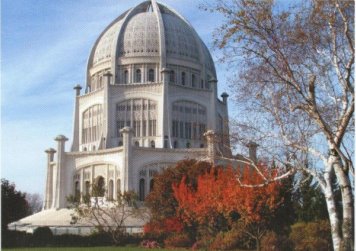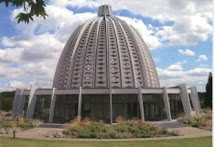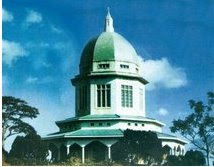 On July 9, members of the Baha’i Faith commemorate the anniversary of the Martyrdom of the Bab (“the gate” in Arabic), one of nine holy days on which members of the Baha’i Faith suspend work and school.
On July 9, members of the Baha’i Faith commemorate the anniversary of the Martyrdom of the Bab (“the gate” in Arabic), one of nine holy days on which members of the Baha’i Faith suspend work and school.
The Báb referred to this coming Divine Teacher as “Him Whom God shall make manifest” and stated that “no words of Mine can adequately describe Him, nor can any reference in My Book, the Bayan, do justice to His Cause.” He clarified the central aim of His mission by explaining that “the purpose underlying this Revelation, as well as those that preceded it, has, in like manner, been to announce the advent of the Faith of Him Whom God will make manifest.” The basis for all human accomplishment is to be found in the teachings of this promised universal Manifestation of God, and “the sum total of the religion of God is but to help Him.” For the Báb, a climacteric in human history had been reached, and He was the “Voice of the Crier, calling aloud in the wilderness of the Bayan” announcing to humanity that it was entering the period of its collective maturity.
Throughout His writings, the Báb warned His followers to be watchful, and as soon as the promised Teacher revealed Himself, to recognize and follow Him. The Báb exhorted them to see with the “eye of the spirit” rather than through their “fanciful imaginations.” To be worthy of “Him Whom God shall make manifest” required entirely new standards of conduct, a nobility of character that human beings had theretofore not achieved: “Purge your hearts of worldly desires,” the Báb urged His first group of disciples, “and let angelic virtues be your adorning...The time is come when naught but the purest motive, supported by deeds of stainless purity, can ascend to the throne of the Most High and be acceptable unto Him...”
The boldness of the Báb’s proclamation—which put forth the vision of an entirely new society—stirred intense fear within the religious and secular establishments. Accordingly, persecution of the Bábis quickly developed. Thousands of the Báb’s followers were put to death in a horrific series of massacres. The extraordinary moral courage evinced by the Bábis in the face of this onslaught was recorded by a number of Western observers. European intellectuals such as Ernest Renan, Leo Tolstoy, Sarah Bernhardt and the Comte de Gobineau were deeply affected by this spiritual drama that had unfolded in what was regarded as a darkened land. The nobility of the Báb’s life and teachings and the heroism of His followers became a frequent topic of conversation in the salons of Europe. The story of Tahirih, the great poet and Bábi heroine, who declared to her persecutors, “You can kill me as soon as you like, but you cannot stop the emancipation of women,” traveled as far and as quickly as that of the Báb Himself.
Ultimately, those opposed to the Báb argued that He was not only a heretic, but a dangerous rebel. The authorities decided to have Him executed. On 9 July 1850, this sentence was carried out, in the courtyard of the Tabriz army barracks. Some 10,000 people crowded the rooftops of the barracks and houses that overlooked the square. The Báb and a young follower were suspended by two ropes against a wall. A regiment of 750 Armenian soldiers, arranged in three files of 250 each, opened fire in three successive volleys. So dense was the smoke raised by the gunpowder and dust that the entire yard was obscured.
The report of the execution, written to Lord Palmerston, the British Secretary of State for Foreign Affairs, by Sir Justin Shiel, Queen Victoria’s Envoy Extraordinary and Minister Plenipotentiary in Tehran on July 22, 1850, records: “When the smoke and dust cleared away after the volley, Báb was not to be seen, and the populace proclaimed that he had ascended to the skies. The balls had broken the ropes by which he was bound but he was dragged from the recess where, after some search he was discovered and shot.”
After the first attempt at execution, the Báb was found back in His cell, giving final instructions to one of His followers. Earlier in the day, when the guards had come to take Him to the courtyard, the Báb had warned that no “earthly power” could silence Him until He had finished all that He had to say. When the guards arrived this second time, the Báb calmly announced: “Now you may proceed to fulfill your intention.”
Again, the Báb and His young companion were brought out for execution. The Armenian troops refused to fire, and a Muslim firing squad was assembled and ordered to shoot. This time the bodies of the pair were shattered, their bones and flesh mingled into one mass. Surprisingly, their faces were untouched. The light of the “Mystic Fane,” as the Báb referred to Himself, had been quenched under a dramatic set of circumstances.The last words of the Báb to the crowd were: “O wayward generation! Had you believed in Me every one of you would have followed the example of this youth, who stood in rank above most of you, and would have willingly sacrificed himself in My path. The day will come when you will have recognized Me; that day I shall have ceased to be with you.”
Wednesday, July 8, 2009
The Báb, Forerunner of Bahá’u’lláh
Labels:
Baha'i Faith,
Forerunner of Baha'u'llah,
Iran,
Messengers of God,
Religion,
The Bab,
USA
Subscribe to:
Comments (Atom)





